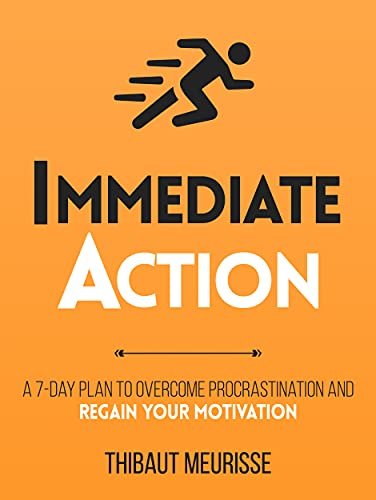Immediate Action: A 7-Day Plan to Overcome Procrastination and Regain Your Motivation by Thibaut Meurisse
Annotated with Cultural and Practical Context for Global Readers
Core Translation & Cultural Context
Original Title: Immediate Action: A 7-Day Plan to Overcome Procrastination and Regain Your Motivation
Author: Thibaut Meurisse (Productivity Coach, Bestselling Self-Help Author)
Genre: Self-Help / Productivity
Cultural Significance: This book addresses procrastination—a universal challenge exacerbated by modern distractions like social media and information overload. Rooted in cognitive-behavioral principles and neuroscience, Meurisse’s 7-day framework merges Eastern mindfulness practices (e.g., Zen decluttering) with Western goal-setting strategies, offering a globally adaptable solution to reclaim focus and motivation.
Full Translation with Annotations
1. Structure and Methodology
- 7-Day Framework:
Each day targets a specific procrastination trigger:- Day 1: Identify Your Why – Uncover subconscious fears (e.g., fear of failure or success) using journaling prompts.
- Day 2: Declutter Your Mind – Adopt Zen-inspired mental minimalism to eliminate decision fatigue.
- Day 3: Break Tasks into Micro-Actions – Use the 2-Minute Rule (if a task takes <2 minutes, do it immediately) to build momentum.
- Day 4: Laser-Sharp Focus – Implement “deep work” sessions with app blockers (e.g., Freedom) to minimize digital distractions.
- Day 5: Leverage Accountability – Share goals publicly or use platforms like StickK to create “commitment contracts”.
- Day 6: Rewire Your Brain – Apply neuroplasticity principles through daily affirmations (e.g., “I am a person who takes action”).
- Day 7: Design Your Action System – Create a personalized workflow using tools like Todoist or Trello for long-term sustainability.
2. Key Concepts
- Procrastination Equation: Meurisse adapts Piers Steel’s formula (Motivation = (Expectancy × Value) ÷ (Impulsiveness × Delay)) to explain why tasks feel overwhelming. For example, low “value” (enjoyment) and high “delay” (long-term rewards) reduce motivation.
- Mind-Environment Loop: Cluttered physical spaces (e.g., a messy desk) amplify mental chaos, making procrastination inevitable—a concept supported by fMRI studies on environmental triggers.
3. Practical Exercises
- Fear-Mapping Exercise: List tasks you avoid and identify underlying fears (e.g., “If I fail this project, my team will judge me”). This aligns with CBT techniques to dismantle irrational beliefs.
- 5-4-3-2-1 Countdown: A grounding technique to bypass overthinking: 5 deep breaths → 4 sensory observations → 3 gratitude points → 2 stretches → 1 micro-action.
4. Scientific Validation
- Neuroplasticity: Daily action-taking strengthens neural pathways associated with discipline, as shown in studies on habit formation.
- The Zeigarnik Effect: Unfinished tasks create mental tension; completing small actions (e.g., drafting an email) reduces anxiety and fuels motivation.
5. Cultural Adaptations
- Eastern Practices: Incorporate zazen (sitting meditation) to cultivate present-moment awareness and reduce impulsivity.
- Western Psychology: Use SMART Goals (Specific, Measurable, Achievable, Relevant, Time-bound) to structure tasks, a method validated in organizational psychology.
Supplementary Materials
- Glossary:
- Amor Fati: “Love of fate” (Stoic concept for embracing challenges).
- Neuroplasticity: The brain’s ability to rewire itself through repeated actions.
- App Recommendations:
- Freedom: Block distracting websites during work hours.
- Habitica: Gamify task completion with RPG-style rewards.
- Further Reading:
- Atomic Habits by James Clear (complements the micro-action strategy).
- The Power of Now by Eckhart Tolle (deepens mindfulness practices).






评价
目前还没有评价